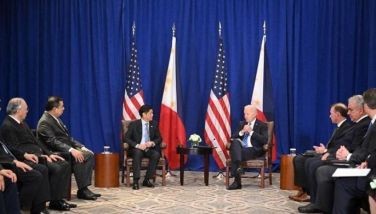FATF hails RP’s anti-launder program
October 3, 2003 | 12:00am
The Paris-based Financial Action Task Force (FATF) and the Asia-Pacific Review Group (APG) have hailed the country’s anti-money laundering program as "outstanding," raising hopes that the Philippines would soon be removed from the list of non-cooperative countries and territories (NCCTs).
The Anti-Money Laundering Council (AMLC) met with representatives from the FATF and the APG as Philippine officials prepared for the November visit of an evaluation team from the APG, the first of a series of on-site evaluation preparatory to the country’s removal from the NCCT list.
The Philippines was put in the list after it failed to act on the concerns raised by the FATF in 2002, before the Anti-Money Laundering Act (AMLA) was passed into law. By the time the law was passed, the Philippines was already singled out for possible sanctions although this was averted when the law was amended to comply with FATF recommendations.
However, the Philippines remained in the NCCT list until the FATF has evaluated and has been satisfied with the implementation of the AMLA.
AMLC executive director Vicente Aquino told reporters yesterday that the AMLC has officially submitted its implementation plan in time for the November visit of two evaluation teams from the APG.
The APG, he said, would be sending its review team to the Philippines on Nov. 10 to 14 to scrutinize operations of the AMLC as well as the anti-money laundering operations of related agencies of the government.
According to Aquino, the AMLC is now conducting meetings with law enforcement agencies and member agencies of the council to discuss the coming on-site review.
"We’ve discussed the possible questions that would be asked and the aspects of the work that they would want to see," he said. "I think we are doing good."
Aquino also disclosed that during the APG meeting in Macau last Sept. 15 to 19, the FATF president, in his opening address, praised the Philippines for its efforts in complying with FATF requirements.
The FATF, he added, had praised the AMLC’s implementation program as "outstanding," making further comments that the Philippines in general has made "tremendous concrete efforts" in order to be removed from the NCCT list.
The FATF was scheduled to meet this week in Stockholm, Sweden but Aquino said the Philippines is not expected to be removed from the NCCT list until the FATF has conducted its own on-site review.
In the last 12 months, Aquino said the AMLC has so far frozen a total of P1.084 billion worth of funds as the council received a total of 154 reports of suspicious transactions as well as over 44,000 reports of covered transactions.
"There has been no increase in the amount of frozen funds because we are not proceeding very differently since the law was amended," Aquino explained. "Before, the AMLC was able to freeze accounts without an order from the court, but the law now requires that we secure a court order before freezing accounts."
Aquino explained that the amendment to the law has compelled the AMLC to change its strategy and conduct investigations on webs of accounts in order to build a case strong enough for the freezing of the entire web of accounts instead of just the mother account.
"This way, we will be able to go after the entire web of related accounts and if we have to freeze these accounts, we could freeze the parent account together with the daughter accounts instead of just individual accounts which could have already dissipated into daughter accounts," Aquino explained.
The AMLC, however, is still waiting for funding for its technologically intensive monitoring system involving the creation of a comprehensive database of financial transactions that would help it identify suspicious and covered transactions that might indicate money laundering activities.
In the coming visit of US President George W. Bush Jr., the Philippine government is planning to ask for specific funding commitment of about $7 million for the AMLC.
The Anti-Money Laundering Council (AMLC) met with representatives from the FATF and the APG as Philippine officials prepared for the November visit of an evaluation team from the APG, the first of a series of on-site evaluation preparatory to the country’s removal from the NCCT list.
The Philippines was put in the list after it failed to act on the concerns raised by the FATF in 2002, before the Anti-Money Laundering Act (AMLA) was passed into law. By the time the law was passed, the Philippines was already singled out for possible sanctions although this was averted when the law was amended to comply with FATF recommendations.
However, the Philippines remained in the NCCT list until the FATF has evaluated and has been satisfied with the implementation of the AMLA.
AMLC executive director Vicente Aquino told reporters yesterday that the AMLC has officially submitted its implementation plan in time for the November visit of two evaluation teams from the APG.
The APG, he said, would be sending its review team to the Philippines on Nov. 10 to 14 to scrutinize operations of the AMLC as well as the anti-money laundering operations of related agencies of the government.
According to Aquino, the AMLC is now conducting meetings with law enforcement agencies and member agencies of the council to discuss the coming on-site review.
"We’ve discussed the possible questions that would be asked and the aspects of the work that they would want to see," he said. "I think we are doing good."
Aquino also disclosed that during the APG meeting in Macau last Sept. 15 to 19, the FATF president, in his opening address, praised the Philippines for its efforts in complying with FATF requirements.
The FATF, he added, had praised the AMLC’s implementation program as "outstanding," making further comments that the Philippines in general has made "tremendous concrete efforts" in order to be removed from the NCCT list.
The FATF was scheduled to meet this week in Stockholm, Sweden but Aquino said the Philippines is not expected to be removed from the NCCT list until the FATF has conducted its own on-site review.
In the last 12 months, Aquino said the AMLC has so far frozen a total of P1.084 billion worth of funds as the council received a total of 154 reports of suspicious transactions as well as over 44,000 reports of covered transactions.
"There has been no increase in the amount of frozen funds because we are not proceeding very differently since the law was amended," Aquino explained. "Before, the AMLC was able to freeze accounts without an order from the court, but the law now requires that we secure a court order before freezing accounts."
Aquino explained that the amendment to the law has compelled the AMLC to change its strategy and conduct investigations on webs of accounts in order to build a case strong enough for the freezing of the entire web of accounts instead of just the mother account.
"This way, we will be able to go after the entire web of related accounts and if we have to freeze these accounts, we could freeze the parent account together with the daughter accounts instead of just individual accounts which could have already dissipated into daughter accounts," Aquino explained.
The AMLC, however, is still waiting for funding for its technologically intensive monitoring system involving the creation of a comprehensive database of financial transactions that would help it identify suspicious and covered transactions that might indicate money laundering activities.
In the coming visit of US President George W. Bush Jr., the Philippine government is planning to ask for specific funding commitment of about $7 million for the AMLC.
BrandSpace Articles
<
>
- Latest
- Trending
Trending
Latest
Trending
Latest
Recommended
































